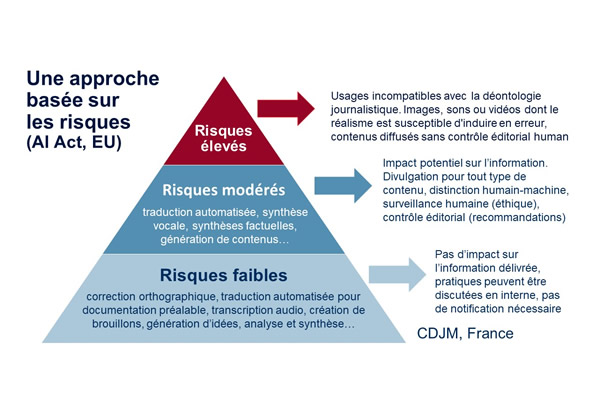I was asked few weeks ago to give insights about the impact of news automation on journalism employment. Here are the questions and the answers.
Will journalists be out of jobs?
First of all, you have to keep in mind that this phenomenon is growing in Western Europe in a particularly difficult context for media companies, which is not without impacting journalists for years now (precarity of freelance, short careers…). It is also a part of the “4th industrial revolution” which is characterized by the transformation of the whole world of work. According to predictive studies, 1 job on 2 would be in danger within the next 20 years. Journalists wouldn’t be the most concerned comparing to employees or sellers. There are few estimations about it: 8.25% in Belgium (ING, 2015), 32% for the whole information and communication sector in Wallonia (IWEPS, 2017), 17% for the whole creative sector in Germany (McKinsey 2017). Other prospective studies are saying that journalists would be more concerned (International Data Corporation 2016 and Ericsson 2017) but, in the same time, all of these studies underline that the jobs which are implying human relations would be preserved. If the most repetitive tasks can be automated in journalism, it is impossible to create a technology which will endorse the important human part of the profession such as the relationship with the sources, opinions, deep contextual analysis, investigative or the definition of newsworthiness. Technology can mimic a human journalist but cannot replace him/her.
Is robot journalism really a threat to journalists?
Until now, we have no clues about job losses because of automation. Freelance journalists could be promptly impacted but only one case was reported to me during my academic research, which has started three years ago. And in this case, it was not sure that it was totally related to automation as editorial choices are also important to take into account. Journalists who are working in press agencies could also be fragilized as it is mainly in this sector that automation is growing but none of them intents clearly to cut off jobs. Axel Springer, CEO of German publishers, has recently declared that there is no threat at all to journalist job. But fears are understandable because of the context of development of automation technologies in newsrooms. By the way, it is not really accurate to talk about “robot journalism”. It is not journalism at all. It is about technologies that permits to transform data to texts or to any other kind of representation. Main actors in this sector are tech start-up who are employing linguists and engineers. And they are not claiming themselves as media companies. Media are client among others but they are the most visible. Claude de Loupy, CEO of Syllabs in France, underlines that the technologies developed by his company is totally not robot journalism but something that you can call automated writing. Personally, I prefer to talk about automated news production which is more accurate to describe software or an algorithm process.
Do journalists need to acquire new skills?
Automated news production can be considered as the continuation of automation in newsrooms, which has started in the late eighties. It can also be considered as the continuation of data driven journalism practices. If journalists cannot compete with those systems, which will always be faster, they can take part of it for investigative or to support their daily routines. I am working on two case studies in Belgium about those concerns: in the first case, I have observed that if the technology gives the raw material to journalists, they don’t need to acquire new skills. The system does the job for them. In the second case, it is about repetitive tasks already done by journalists which are automated. It permits them to get more time to do more valuable tasks. But within the academic field, there are voices that are pleading that journalists learn « computational thinking » or « design thinking ».
What should be expected from the media companies?
There is a trending discourse among publishers and media influencers about the pledge of innovation in media. But pay attention to buzz words… First of all, any kind of innovation has a cost. Secondly, there is no interest to innovate just because it is a fashion. But there is a fact that the latest technological development could support journalists for their investigative or their daily routines. If we have a look on the leaks like the Paradise Papers, it was humanly impossible to deal with so huge amounts of data without IT. Another point is not to lose what audiences are expecting from a news media. Good journalism is not about technology. The opportunities given by technologies cannot obscure that the improvement of working conditions, especially for freelancers, is the first condition to improve quality in journalism. Moreover, if innovation and AI can support great journalism in many ways, the needs of the users are not always met. For example, in France, Nice Matin developed a chatbot that failed mainly because of the distortion between the conception of the system and the expectations of the audiences
Do you know any good/bad practices that are happening at the moment?
Interesting cases are observed in Europe. NTB, the Norwegian press agency, has started to automate contents to extend its sports coverage. The point was to do something that was not done before. In Sweden, experiences with automation lead at MittMedia show that it supports journalists in their routine with freeing them from time consuming tasks or with alerting them about hot topics. In Finland, journalists say that there are happy to work with a machine because of its benefits for their work. So instead of seeing automation technologies as adversaries, why not taking their best part and make them allies? We have now enough examples that demonstrates that it is working. But at the contrary of an algorithmic process, human intents are characterized their unpredictability… Don’t forget that behind any technology, there are humans behind who will take decisions and design the process. In this way, the best practices are to associate journalists to those process. It is also a way to demystify the complexity of the technology as well as its opacity. The worst practice is not to mentioned that the content (text or video) is generated automatically. Every day, we can be exposed to automated contents without knowing it. It is not about the right to know about it. It’s a matter of confidence between the media and their audiences, as well as between the media and their journalists.





